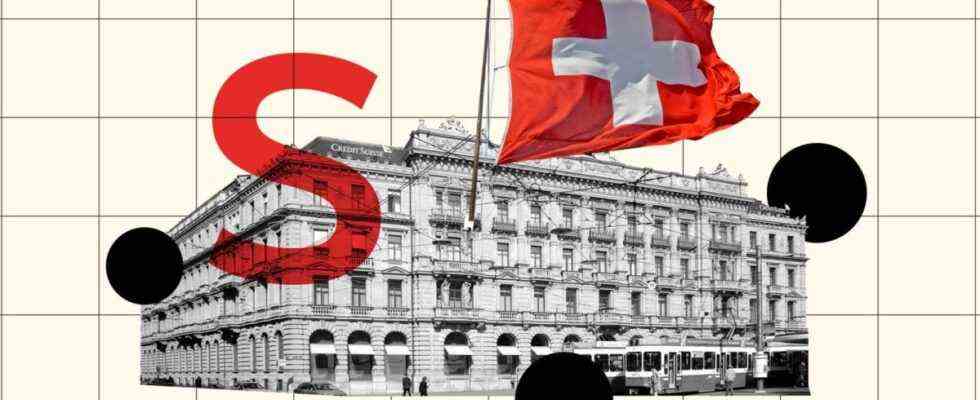The second largest bank in Switzerland Credit Suissehas for many years accepted corrupt autocrats, suspected war criminals, human traffickers, drug dealers and other criminals as clients. This is evidenced by data from the financial institutionthe the Süddeutsche Zeitung leaked from an anonymous source. The filings shed light on the accounts of more than 30,000 customers around the world and alleged failures by the bank to screen its customers. Credit Suisse rejects the allegations. A large part of the accounts had also long been closed.
According to the Suisse Secrets data criminals could have accounts with Credit Suisse open or keep their accounts even when the bank should have known long ago that they were dealing with criminals. In doing so, banks must recognize such persons as well as heads of state or government, ministers, secret service agent or entrepreneurs with questionable business practices with particular care – and report to the authorities if they notice assets of unknown origin that could originate from or serve criminal offenses. For example, money laundering should be avoided.
the Data from Suisse Secrets range from the 1940s to well into the past decade, more than two thirds of the available accounts were opened after the year 2000, and according to SZ research, many of them still exist today. A human trafficker convicted in the Philippines and an Egyptian murderer are also included in the data, as are cardinals allegedly involved in shady dealings and the former Siemens manager Eduard Seidel, who was convicted of bribery in 2008.
The former Nigeria boss of the Munich global corporation had six accounts with Credit Suisse at times. According to the data, one of them peaked in 2006 assets worth more than 54 million Swiss francs registered – a sum that is difficult to explain with his Siemens salary. When asked, the ex-manager denied wrongdoing without explaining where the millions came from.
Credit Suisse declined to answer specific questions about this case or the other questionable accounts, assured butto adhere to “the highest standards of conduct”: “In conducting its business operations, Credit Suisse complies with applicable global and local laws and regulations.”
According to the internal bank data numerous heads of state and government, ministers and intelligence chiefs, as well as oligarchs and cardinals are clients of Credit Suisse. Among others, the Jordanian King Abdullah II, the former Iraqi Deputy Prime Minister Ayad Allawi, the Algerian autocrat Abdelaziz Bouteflika and the Armenian ex-President Armen Sarkissyan appear in the documents. Sarkissian resigned as President in January, shortly after the Southgerman newspaper had sent him an inquiry about his accounts at Credit Suisse. The politician said he had closed all accounts before he was required to declare his assets – a national anti-corruption agency is now looking into it.
the Southgerman newspaper has the Credit Suisse data along with the Organized Crime and Corruption Reporting Project (OCCRP) and 46 media partners from around the world, including the UK Guardians, Le Monde in France and the New York Times evaluated. were in Germany NDR and WDR involved in the research. The results are published under the title “Suisse Secrets”. Credit Suisse spoke of a “concerted action with the intention of strengthening the Swiss financial center […] to bring into disrepute”.
No medium from Switzerland took part in the research, as the local banking law could make it possible Prosecuting journalists for researching leaked bank details. Critics see this as a massive restriction of press freedom. “It would violate international human rights law to prosecute or punish journalists for publishing bank information that is of public interest,” said Irene Khan, the UN Special Rapporteur on Freedom of Expression. She started an investigation.
Switzerland is considered one of the most opaque financial centers in the world. Any disclosure of account information is punishable by law. Banking secrecy has been relaxed in recent years, as Switzerland exchanges information about account holders with a number of countries – but not with some of the poorest and most corrupt countries. This is how a large number of customers in the Suisse Secrets data come from from VenezuelaEgypt, Ukraine and Tajikistan – all countries in which members of the political leadership were repeatedly suspected of being corrupt.
“I believe that Swiss banking secrecy is immoral”, explained the source of the Suisse Secrets data, which the SZ is not aware of, in a statement. “The pretense of protecting financial privacy is just a fig leaf to cover up the shameful role of Swiss banks as collaborators with tax evaders.”
Credit Suisse has been for the past two decades involved in dozens of scandals and has paid more than $10 billion in penalties during that period. The institute is currently having to answer to a court in Switzerland for the first time because it a Bulgarian drug cartel allegedly assisted in money laundering. Credit Suisse denies the allegation.
According to SZ information, the Senate Finance Committee in the USA is now investigating the suspicion that the bank may have helped US citizens with tax evasion. In 2014, the institute was hit with a record fine of 2.6 billion US dollars. In mid-January, Chairman of the Board of Directors António Horta-Osório had to resign because he is said to have repeatedly violated corona quarantine regulations. Shortly thereafter, the bank issued a profit warning.

